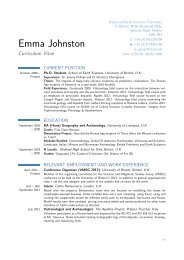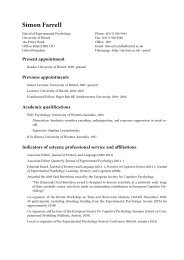What is Scientific Progress?
What is Scientific Progress?
What is Scientific Progress?
Create successful ePaper yourself
Turn your PDF publications into a flip-book with our unique Google optimized e-Paper software.
account says nothing about the rate of progress. It <strong>is</strong> plausible to hold that those additions to<br />
knowledge that are also instances of understanding are, other things being equal, more significant<br />
than those that are not. I will however leave a detailed d<strong>is</strong>cussion of the important question of what<br />
contributions to knowledge contribute most to progress (and in particular the role of understanding)<br />
for another occasion—not least because it <strong>is</strong> a much more difficult question.<br />
In another direction, it may be claimed that science aims merely at true theories rather than at<br />
knowledge of the truth of theories. Th<strong>is</strong> <strong>is</strong> because it <strong>is</strong> widely assumed that truth <strong>is</strong> the aim of<br />
belief in general, with scientific belief being just one kind of belief. Th<strong>is</strong> general presumption about<br />
the aim of belief would explain why real<strong>is</strong>ts have looked to an account of progress in terms of truth<br />
or ver<strong>is</strong>imilitude. In the light of (A), the semantic approach to progress lines up with the view that<br />
belief aims at truth, while the ep<strong>is</strong>temic approach lines up with the view that the aim of belief <strong>is</strong><br />
knowledge rather than truth. Thus if the arguments presented for the ep<strong>is</strong>temic view are persuasive<br />
then they also lend support to the view that belief aims at knowledge, since given (A) that view of<br />
the aim of belief best explains why we think that progress cons<strong>is</strong>ts in the accumulation of<br />
knowledge. Conversely, independent argument for the knowledge view of the aim belief will<br />
support the central thes<strong>is</strong> of th<strong>is</strong> paper.<br />
Th<strong>is</strong> <strong>is</strong> not the place to pursue a general ep<strong>is</strong>temic enquiry concerning the aim of belief. The<br />
purpose of th<strong>is</strong> section has been to point to the link between that project and the debate over<br />
progress. However, given the presumption in favour of the view that belief aims at truth, I shall<br />
conclude with a few remarks intended to point the reader in the other direction. Timothy<br />
Williamson’s recent attempt to redraw the geography of ep<strong>is</strong>temology, placing knowledge at the<br />
centre of the map (Williamson 2000). A major feature of th<strong>is</strong> conception <strong>is</strong> the view that belief aims<br />
33






